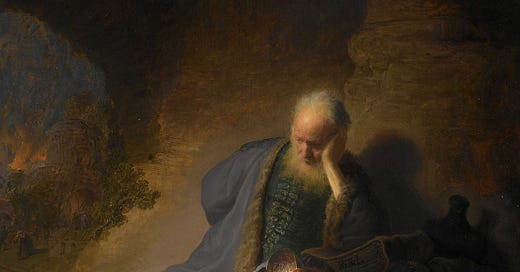Jeremiad is a rhetorical device that goes back to Moses and the biblical book of Jeremiah and was later adopted by American Puritans. It is characterized by a distinctive style of lamentation, critique, and exhortation, typically employed to condemn societal sins, predict impending doom, and urge repentance.
Jeremiads typically begin with a lamentation of the current state of affairs, critiquing the moral decay and spiritual corruption of the community. It often invokes divine judgment, warning of impending doom and punishment if the community fails to repent and reform. The primary purpose of the jeremiad is to call the community to repentance, urging them to return to their spiritual roots and rediscover their moral bearings.
Jeremiads emphasize the idea of a covenant or contract between God and the community, highlighting the community's failure to uphold their end of the bargain brings about punishment. The upholding of it brings blessing and prosperity.
In the book of Jeremiah the prophet employs the jeremiad to condemn the sins of Judah and warn of impending judgment. In Jeremiah 2:1-13 he laments the faithlessness of Judah, condemning their idolatry and immorality, and warning of divine judgment. He also critiques the corruption of the Temple and the moral decay of the community, urging them to repent and reform in Jeremiah 7:1-15.
American Puritans, such as John Winthrop and Cotton Mather, adopted the jeremiad tradition to critique the sins of their communities and urge repentance. For example, John Winthrop's A Model of Christian Charity (1630) uses the jeremiad to urge the Massachusetts Bay Colony to live up to their covenant with God, warning of divine judgment if they fail to do so. Cotton Mather, in The Day of Trouble is Near (1688), uses the jeremiad to condemn the sins of the Massachusetts Bay Colony. He warns of impending judgment and urges repentance.
In The Death of Jeremiah? Marilynne Robinson and Covenant Theology
Christie L. Maloyed seeks to prove that the convenant theology and the jeremiad tradition Robinson claims to have inherited from Calvinism and Puritanism have been reworked. Robinson "reimagined the jeremiad tradition," according to Maloyed, to move
the tradition toward a more inclusive theology and political ideology.
Maloyed notes how Robinson's reworking of the jeremiad makes this rhetorical tradition more acceptable for a modern audience in several ways. She describes how Robinson reworked the jeremiad in various ways. Her novels, such as Gilead and Home, shift the focus of the jeremiad from condemnation and judgment to compassion and empathy. As Maloyed notes, Robinson's works present a "jeremiad of compassion" that emphasizes
the importance of human relationships and community.
Also, Robinson's works emphasize the human experience and emotion, rather than simply condemning sin and calling for repentance. Maloyed argues that Robinson's novels "reimagine the jeremiad tradition" by focusing on
the complexities and mysteries of human experience.
The novels also reframe the concept of sin, moving away from a simplistic notion of moral transgression to a more nuanced understanding of human fallibility and vulnerability. In these novels, Robinson employs a more subtle and suggestive tone, rather than the overtly condemnatory and judgmental tone often associated with the jeremiad. As Maloyed observes, Robinson's work presents a "more nuanced and complex" understanding of the jeremiad tradition.
Since Robinson's works address a multicultural society where there are diverse religious beliefs and skepticism, the aversion of some to jeremiads and convenant theology is understandable. Despite this what cannot be denied is clear. History has given us its cycle. It goes on and on, this cycle described by Robert Frost as "total revolution" which "brings the same class up on top" and grinds another to dust.
The vast economic inequalities and poverty in France contributed to the outbreak of the French Revolution, which led to the overthrow of the monarchy, widespread violence, and the Reign of Terror. The poverty and inequality faced by Irish peasants, combined with the failure of the potato crop, led to a devastating famine that killed over a million people and forced another million to emigrate. The poverty and inequality faced by Russian peasants and workers contributed to the outbreak of the Russian Revolution, which led to the overthrow of the Romanov dynasty and the establishment of the Soviet Union. The poverty and inequality faced by millions of Americans during the Great Depression led to widespread suffering, homelessness, and the rise of extremist political movements.
It goes on and on, this wheel whose spokes are cut from the same material, spokes blurring into one as the wheel goes on and on. Faster. Remember. The poverty and inequality faced by Chinese peasants, combined with the forced agricultural collectivization and industrialization policies of Mao Zedong, led to a devastating famine that killed tens of millions of people. The inequality faced by the Igbo people of Nigeria contributed to the outbreak of the Biafran War, which led to the deaths of over a million people. The poverty and inequality faced by Cambodian peasants, combined with the radical socialist policies of the Khmer Rouge, led to the deaths of an estimated 1.7 to 2.2 million people. The poverty and inequality faced by Haitian slaves contributed to the outbreak of the Haitian Revolution, which led to the establishment of the world's first independent black nation.
If faith (the Judeo-Christian) is absent or denied on the grounds of multiculturalism, do we not have the lessons of history as jeremiads which we ignore to our peril?





